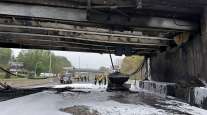Connecticut Republicans Attack Governor’s Truck-Tax Plan

[Stay on top of transportation news: Get TTNews in your inbox.]
HARTFORD, Conn. — Republican state lawmakers, along with trucking and food-distribution executives, on April 28 declared war on Gov. Ned Lamont’s proposed regional climate initiative and user tax for heavy trucks on state highways.
They called for the state to invest instead in greenways and open space, and again called for Connecticut’s delegation in Congress to push for air pollution reductions in midwestern states whose emissions drastically affect air quality through prevailing winds.
On a downtown street corner a block from the State Capitol complex, House Minority Leader Vincent Candelora and Senate Minority Leader Kevin Kelly charged that Lamont’s participation in the regional Transportation and Climate Initiative would steadily raise gasoline taxes on working families while providing subsidies for wealthier residents to buy electric cars.
Republicans attack Lamont climate-change and truck-tax proposals https://t.co/uvLIWCK5jz via @ConnPost #CTPolitics #TCI #climatechange — Ken Dixon (@KenDixonCT) April 28, 2021
“Gov. Lamont and his majority are advocating for $200 million of taxes levied against gasoline and trucks that the middle-class families of Connecticut are going to have to pay at a time when the middle-class family is struggling,” Kelly said. “These taxes are the most regressive taxes. They’re coming after the middle-class wallet. What’s worse is that these taxes won’t even deliver on the promised environmental clean air that they are focused to be used for.”
Under the TCI, petroleum wholesalers would pay for emission credits, raising pump prices by 5 cents a gallon in the first year, and not more than 10 cents a gallon by 2032, Lamont has said. The GOP lawmakers warned that it is likely to rise steadily over 10 years.
The proposal, which is estimated to bring in about $90 million in new state revenue in 2023, was approved by the Legislature’s Environment Committee last month and awaits further action in the General Assembly. The money would be used for transit and transportation improvements.

House Minority Leader Vincent Candelora by Brad Horrigan/courant.com via Tribune Content Agency
Joe Sculley, who as president of the Motor Transport Association of Connecticut represents the state’s haulers, said the TCI could “crush” small business in the state by raising prices. “It’s just a money grab,” he said, adding that the truck mileage tax has failed in 20 states. He stressed that with no auditing in the rule, out-of-state-based companies would not pay it.
He called for the state to use its emergency reserves of more than $3 billion and federal pandemic relief of $2.7 billion to fund the state’s transportation infrastructure needs. Additional money may come from the federal government to Connecticut under President Joe Biden’s proposed infrastructure program.

Pruchnicki
For John Pruchnicki, owner of the Ansonia-based Coastal Carriers of Connecticut Inc., the highway-user tax on heavy trucks, which was approved last week in the Legislature’s Finance Committee, would add $175,000 to $200,000 a year to his business costs. He said he would pass that cost to his customers.
“We don’t understand why there seems to be a target on the back of the trucking industry from this governor,” Pruchnicki said.
“Simply put, the supply chain cannot be disrupted,” said Pruchnicki, whose fuel trucks supply gas and heating oil dealers. “We as an industry won’t let it happen. Those companies will pass on the additional costs at the pump, or the consumer of a house heated by heating oil.”

Sculley
“What we would rather see happen is that we utilize our funding to reduce congestion on areas like [Interstate] 95, to reduce greenhouse emissions through that,” Kelly said, adding that rebates, credits and changes to building codes could be low-cost ways to fight climate change, combining with conserving green spaces.
Lamont, after an event in Meriden on April 28, said that the highway use tax is aimed at out-of-state trucks that take advantage of free interstate travel. He said he would listen to alternative proposals on how to fund the state’s future transit needs at a time when the gasoline tax is failing to provide enough revenue.
“They keep making it up,” Lamont said of the GOP criticism and campaign against his proposals.
“These trucks come in from four different states,” he said. “Each of those states has either highway user fees or tolls, then they come into the state of Connecticut and get a free ride. I want to make sure these trucks pay their fair share when it comes to keeping up our roads and bridges. If they have a better idea on how they want to pay for the roads and bridges, I am all ears. Last time they said ‘Let’s raid the rainy day fund.’ ”
The governor’s campaign pledge of 2018, to establish truck-only tolls, was turned down by legislative Democrats. But during their attempts to defeat the idea, Republicans suggested that infrastructure costs could be paid through $700 million transferred from the emergency reserves — commonly called the rainy day fund — which is currently more than $3.5 billion.
The Republican leaders on April 28 backed away from possibly suggesting such a use of the reserves this year.
Want more news? Listen to today's daily briefing below or go here for more info:
Distributed by Tribune Content Agency, LLC



